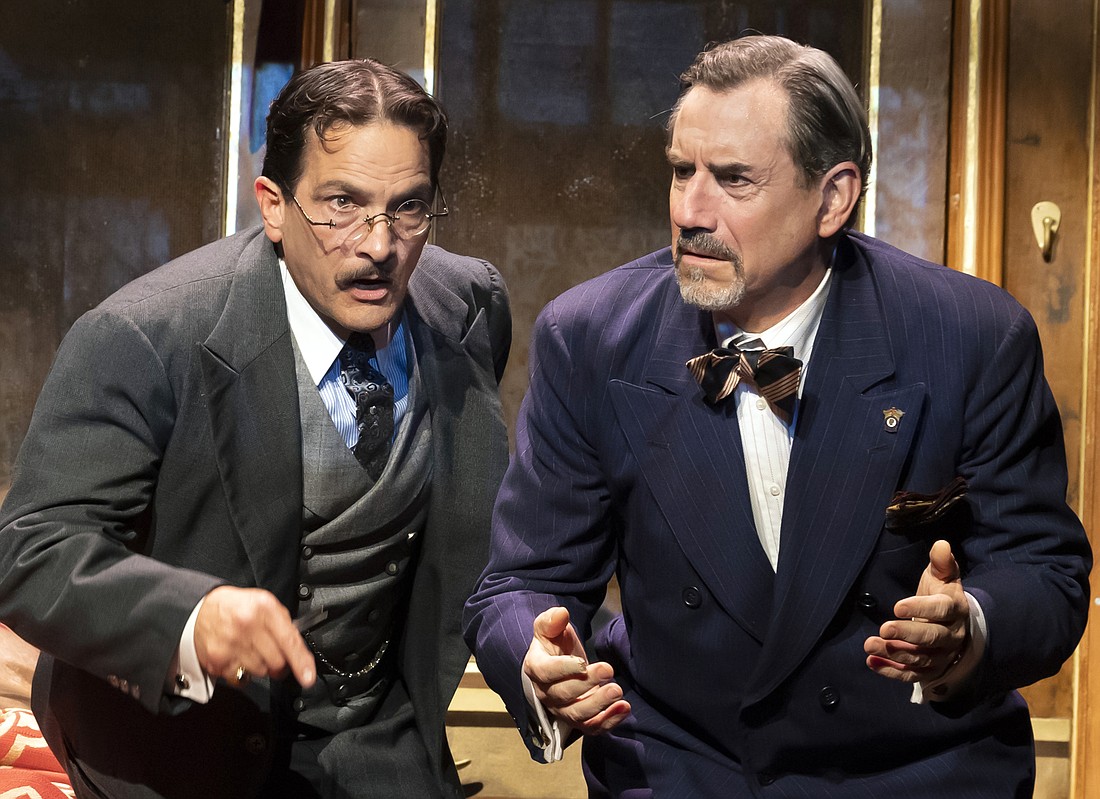- April 18, 2024
-
-
Loading

Loading

Agatha Christie’s “Murder on the Orient Express,” has been adapted to death — for film and TV, anyway. She wrote the novel in 1934. The author’s estate dragged its feet on a stage adaptation until 2017 — and finally gave permission to Ken Ludwig. His version just pulled into the station at the Asolo Rep.
Hercule Poirot (James DeVita) is the hero. Christie’s signature character, of course, he is aBelgian detective with an elegant mustache and a low-key, methodical approach to crime-solving.
The play opens with a grim vignette, revealed on a projection screen. It’s a scene in the 1920s, the play’s recent past. An odious crime, echoing the Lindbergh baby kidnapping. A little girl taken; a little girl strangled; a ransom paid for nothing; a criminal who got away with murder. That nasty flashback segues to Poirot’s sad soliloquy about his most disturbing case. The Murder on the Orient Express, bien sur.
That heavy introduction hints of fear and loathing. But there’s comedy afoot as the case unfolds.
It starts in Istanbul. After an ugly incident in Syria, Poirot needs to get to Paris. Sadly, the Orient Express is fully booked. Happily, Poirot is pals with Monsieur Bouc (David Breitbarth), the train company manager. Bouc wangles Poirot a ticket, and they get on board with seven paying passengers: Samuel Ratchett (Matt DeCaro) a thuggish American tycoon; Princess Dragomiroff (Peggy Roeder), an exiled Russian aristocrat; Countess Andrenyi (Diana Coates), an alluring Hungarian with medical training; Mrs. Helen Hubbard (Tina Stafford), an over-the-top American actress with a Minnesota accent straight out of “Fargo”; Colonel Arbuthnot (Jonathan Grunert) a Scottish military hero; and his pre-divorced lover, Mary Debenham (Helen Joo Lee), a former governess.
And away they go. Then a blizzard hits, and the train stops going. It’s stuck in a snowdrift in Yugoslavia. Even worse, it seems the American swine has been stabbed repeatedly like a human pincushion. It is now, as you say, a locked-room mystery. Whodunit? Poirot is on the case.
The train’s going nowhere and nobody’s getting off. QED: The killer is still on board. Poirot politely grills each passenger. Bouc assists him, desperately hoping Poirot will solve the crime before the scandal goes public. (Murder’s bad for tourism, after all.) Poirot does brilliant detective work, but he knows something’s wrong. There’s an orgy of evidence. Every passenger has both a motive and an alibi. And they’re all so damn theatrical—not to mention multicultural. But enough summary. On the remote chance you don’t know Christie’s twist ending, this is a good place to get off.
Poirot’s a figure of fun in several adaptations— the funny little foreigner with the funny little moustache. DeVita plays him with gravitas and razor-sharp acuity. His character’s no joke. But he’s not a crime-solving human computer, either. Poirot knows he’s on the wrong track — and might never solve this case. At the end of the line, he does and faces a dilemma that rattles his moral code. Breitbarth’s portrayal of Bouc is subtly hilarious. A fat American has been killed A tragedy, yes. But bankruptcy would be a greater tragedy.
Matt DeCaro brings a menacing edge to the wretched role of Ratchet. Grant Chapman and Alex Pelletier fill in as flunkies for various rich people. Gregg Weiner’s conductor is unflappable, taciturn and clearly hiding something. But that applies to everyone.
Peter Amster’s direction clicks along and never gets derailed. The train may be stuck, but the play isn’t. You always feel like you’re going somewhere. Even if you know the ending, you’ll still enjoy the ride.
Paul Tate dePoo III wowed Asolo audiences with his inventive set design for “The Sound of Music.” He’s done it again.
In lieu of chuffing an actual locomotive on stage, he’s created a rotating set, which shifts to the interiors of various train compartments, each framed in black like a life-sized diorama. A projection screen above the set illuminates the action. Brilliant. Tracy Dorman’s costumes never feel like a fancy-dress costume party. They resemble somebody’s actual clothing, picked out from an actual closet. Jax Messenger’s lighting, Matt Parker’s sound design and Greg Emetaz’ projections create a cinematic combination. This production feels like a movie at times. It wants to take you places — and aches to bust out of the stage.
But their success hinges on Ludwig’s script. Christie purists may cry heresy, but it works for me. The playwright honors the source material — aside from the bits he cuts. To speed the play, he’s dropped confusing subplots and left four passengers off the train. He’s also added comedy — but don’t expect a camp romp. It’s a laugh-filled play, but the tragedy that drives it is no laughing matter. Crime and punishment is at the heart of it all. Dispensing justice can be a form of punishment. Dispensing mercy can be, too.
You probably know Christie’s twist ending. But Ludwig adds a twist of his own. Without spoiling the gut-punch revelation, he reminds you of the human cost of ugly crimes.
Poirot finds a brilliant solution. It’s a hollow victory, because the victim is still lost.